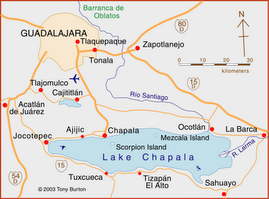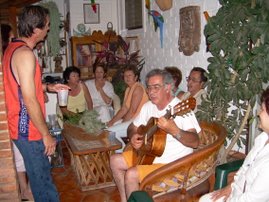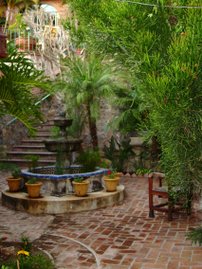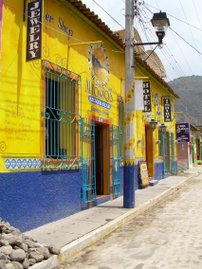(photos from keelynet.com)
You hear people today praise the rains and they always explain that they remember when the lake was very low. Here is an excerpt which explains a bit about the lake's recent history, taken from chapalaguide.com:
| The Lake is about 75 kilometers (50 miles) long from east to west with a maximum north-south width of about 20 kilometers (12.5 miles). Its large surface area (1,050 square kilometers or 405 square miles) makes it the largest natural lake in Mexico and the third largest in Latin America, after Lake Titicaca and Lake Nicaragua in Central America. Despite its size, Lake Chapala is quite shallow, with an average depth of only slightly over four meters (13 feet) and an maximum depth of less than 30 meters (9.75 feet)— Tony Burton The region surrounding Lake Chapala comprises eight municipalities in the state of Jalisco and four in the state of Michoacan. Most of the area's visitors and residents from abroad gravitate to the Northshore municipalities of Ajijic, Chapala and Jocotepec.-- Dale Hoyt Palfrey Lake Chapala has undergone a dramatic transformation since the start of the new millennium. In June, 2002 the lake stood at the lowest level recorded since 1955, holding less than 15 per cent of its full water storage capacity. The dire situation prompted a number of environmental activists to warn of Chapala's imminent demise, a prediction that fortunately proved dead wrong. Abundant precipitation during the 2003 and 2004 rainy seasons has brought the lake back to around 75% full capacity and the highest level registered since the early 1980's. The State of Jalisco now opens dams from nearby rivers to help control the level of the lake as well, and limits have been established as to how much water may be taken from the lake for irrigation. This year's rainfall of over 42 inches is already well above the average rainfall of 31.9 inches, so the lake is even higher this year: good for tourism and fo the farmers. Ironically, much of the Guadalajara water supply comes from Lake Chapala, yet our local water comes from drilled wells. Pixie has started teaching again at the Love in Action orphanage, in Chapala. She teaches a conversational English class to four children every Wednesday morning, and on Fridays, she and another couple from our Unitarian fellowship, Sue and Kelly, conduct a library time for the children. Sue was a librarian in her former life and, together with Pixie and Kelly, she has set up a wonderful library with English and Spanish books, puzzles, and computers to give the children something interesting to do. Here are some photos of the children during last Friday's library session: |
On another topic, Pixie and I have recently finished reading an interesting book, The China Study, by T. Colin Campbell and his son Thomas (http://www.thechinastudy.com/). In this book, which was based on a series of longitudinal studies on diet and disease in China, the authors reach the conclusion that plant-based diets, as eaten in many areas of the world, are healthier and provide protection from many "diseases of affluence" such as cardiovascular disease; prostate, breast and colon cancers; diabetes; and hypertension. He surmises that it's not just the saturated fat which causes so much harm, but the animal protein as well. Of course, he advocates a vegan diet, which includes no dairy products or eggs either.
Well, after reading this book, and a few others, watching Pixie's favorite TV doctor, Dr. Oz, and thinking about our diet, we have started converting to a vegetarian diet. Living in meat-loving Mexico makes it tricky, but we are trying to move in that direction. We try to eat a vegan at home, except for low fat yogurt, which we both enjoy. There are thousands of delicious vegan recipes on line. Eating out and at others' homes is not as easy. We will, of course, eat the food which is served by others in their homes although I must say, most of our friends eat healthy diets. When we eat out, we will occasionally eat fish or chicken and cheese. So, I guess we are doing vegetarian as much as is reasonably possible. So far, it's not hard and we enjoy cooking and trying new recipes. We'll see how it works out in the long run. We are fortunate to have so many fresh vegetables and fruit available locally.
Our birds of paradise have continued with their "miracle" blooms; we now count five!
Finally, I attended the annual awards luncheon for the writers in the local magazine, El Ojo del Lago (Eye of the Lake) last week. My column, "Uncommon Common Sense" won this year's award for best column. No money, of course, but a nice plaque.
The column is really about critical thinking, although I often adapt it to local issues or worldwide events. In October, I am writing about the Islamic community center being proposed near ground zero, and use the emotional opposition to this project as an example of collective "weak thinking." This month's column is included below, for any who may be interested. You can access the magazine online at http://www.ojo.chapala.com/
Why Do People Believe Weird Things?
In my former life, I was a professor at a community college. I have had a long-standing interest in rationalism and critical thinking. I was active in the “critical thinking movement” in education. This was an effort to transform education from the “lecture and regurgitate” model of learning to a pedagogy which insisted that students learn how to think and reason, how to decide for themselves what to believe. Our goal, I believe, was to teach our students how to learn, how to think, not what to think. So that’s my bias.
When I attended a college graduation in Maine one spring, the commencement speaker was an eminent educational reformer. When he stood up to speak, the first words from his mouth were as follows: “The purpose of a college education is to teach you to be a good crap detector!” It shocked the audience a bit, but I think he was right. The purpose of being an educated person is to be able to decide what to believe and what’s just a bunch of crap.
Why do so many otherwise intelligent people believe so many wierd things? An example: I have met a number of people who really believe that George Bush ordered the destruction of the World Trade Center towers on September 11, 2001. They point to “evidence” that he was in cahoots with the Saudis, that scientists claim that the towers were sabotaged, that he needed a crisis to revive his presidency, etc. Now I may be unsophisticated, but I just don’t find this plausible. I may be proven wrong, but from what I’ve read so far, I doubt it.
Some people believe that eating a particular Chinese herb will single-handedly prevent illness and extend their lives. Others believe that your dead relatives are trying to communicate with you, that wearing a takionic headband can improve your thinking, that psychics can predict the futrue, and that planning their lives around astrological configurations will bring them prosperity and happiness.
These are just some examples of what I consider to be “weird” beliefs people have. If I haven’t alienated all my readers by now, I’ll consider why I think such beliefs persist.
First of all, I think the world is a confusing and scary place. Bad events may affect any one of us at any time. So, because we fear the unknown and the randomness of events, we are always looking for ways we can stay in control. As a result, we are vulnerable to those who claim to provide easy solutions to problems which may, by their very nature, be insoluble. If I believe I can avoid problems by looking at the configuration of the stars, then that’s comforting. If I convince myself that I can avoid a random illness by ingesting a particular herb every day, then I will feel safer.
The root of our anxiety, I think, is fear of the randomness of life. We look for ways to “control” our lives. We are susceptible to claims that promise to protect us from illness, unhappiness, or loss. We look for explanations which make us feel in control of our lives. The reality that we often have little or no control, or that our loved ones are gone forever, is a frightening prospect.
The problem, of course, is that instead of basing our beliefs on clear evidence, we sometimes base them on what we want to be true. We want to be able to control our health and make ourselves happy. Unfortunately, most of these so-called solutions, are ineffective. Conspiracy theories are popular because they explain, and assign blame. In reality, we cannot control many things in our lives. We need to become good “crap detectors” and make sure when we decide what claim to believe, that we first carefully examine the evidence.

.jpg)










































































1 comment:
Congrats on your award.
After reading your comments in "Why do People Believe in Weird Things?" I'm reminded of some of the results coming out of behavioral finance. They corroborate some of your observations people acting irrationally, particularly if money is involved.
Post a Comment